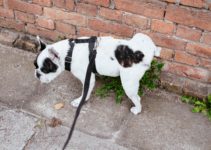French bulldogs have a curious nature and they often find their way to get in trouble. Their curiosity brings a lot of dangers to them especially when they are trying to eat things that they are not supposed to. One of the concerns that a Frenchie owner can face in their lives is their pup ingesting the aluminum foil. If you find that your Frenchie eats aluminum foil it’s time to act cautiously. This blog will tell you about some steps that can help you if your Frenchie eats aluminum foil.
Understanding the Risks
Aluminum foil is mostly used for eating food and it can attract dogs easily. The dangerous food items present on the foil entices them to smell and taste the foil and along with that, they can accidentally swallow the foil. However, there are many risks associated with ingesting the aluminum foil.
- If your Frenchie has ingested a larger piece of foil it can lead to blockage and choking in the throat.
- If they ingested foil, it can cause obstruction in the intestine or stomach which further leads to severe complications.
- The aluminum foil itself is not that toxic but the food residue on it is salty, greasy, and spicy which can upset the stomach of your Frenchie and cause pancreatitis.
Immediate Actions to Take
If you find that your Frenchie has ingested the aluminum foil here are some immediate steps that can help you:
Stay Calm
The first step is not to panic in the situation as it will not help your dog and make everything more challenging. Stay calm and try to assess how much foil your dog has swallowed and whether it has food or not. This information will help when you go to the veterinarian.
Check for Immediate Symptoms
Keep an eye on your Frenchie for any sign of stress. Some common symptoms that can appear are:
- Diarrhea
- Vomiting
- Gagging or choking
- Lethargy
- Abdominal pain or swelling
- Loss of appetite
If your Frenchie is showing any of these symptoms consult your vet immediately.
Contact Your Veterinarian
Consulting your veterinarian for advice is very important even if there are no visible signs. Provide complete detail to them on the amount of foil they swallow and the type of food particles on the foil. Your vet is the right person to tell you whether to monitor our Frenchie at home or bring them to the vet for examination.
Veterinary Care and Treatment
It all depends on the situation of your pup and which due course of action would be followed.
Inducing Vomiting
If your Frenchie eats the aluminum foil recently and it’s still in the stomach then the vet will try to induce vomiting to prevent the foil from entering the intestine. However, this procedure should be performed only under supervision because improper inducing vomiting will cause additional complications.
Monitoring and Supportive Care
If vomiting is not an option and the foil has already moved in the intestine, then your vet will monitor the dog closely and perform the following actions:
- Ultrasounds or X-rays to track foil moment
- Regular check-up
- Special food to pass foil naturally
- Administering fluids to prevent dehydration
Surgery
If the foil has caused a blockage in the intestine then surgery is necessary for the removal of the foil. Surgery is usually the last option and is usually done when all other treatments are failed and the situation is life-threatening.
Home Care and Monitoring
Sometimes if the problem is not too serious then your vet can ask you to monitor your Frenchie at home. Things that you can do to monitor their safety are:
Keep a Close Watch
Keep a close eye on your Frenchie for any change in the behavior. If your Frenchie is suffering from diarrhea or vomiting or any other sign of pain consult your vet immediately.
Maintain Hydration
Make sure your French bulldog has access to clean fresh water. Dehydration can further enhance the issues caused by the ingestion of foil.
Feed a Bland Diet
Your vet will recommend feeding a balanced diet like boiled rice and chicken, it will help in passing the foil through the digestive system. Don’t feed any spicy, fatty, or oil-rich food as it can upset the stomach of your pup.
Check Stools
While it might not sound pleasant checking your dog’s stool for pieces of aluminum can help your vet a lot in determining if the foil has passed through the system or not.
Preventing Future Incidents
Preventing such incidents from happening in the future is very important. To prevent such incidents from happening in the future consider the following tips:
Proper Disposal
Make sure that you put the aluminum foil and food scraps in a secure trash where your dog cannot reach. Use a trash can with a lid or keep the foil in the cupboard.
Keep Foil Out of Reach
Always keep the wrapped food items in places where your dog cannot reach. Never leave the foil or wrapping item on the table or shelves where your pup can jump and reach easily.
Training
Train your pup not to eat nonfood items Train them commands like “drop it” and “leave it” as these can be very useful in preventing them from getting in harmful situations. Positive reinforcement methods can help in teaching these commands.
Provide Appropriate Chew Toys
Provide your Frenchie chew toys that are safe. This will not only satisfy their chewing needs but also reduce the chances of chewing inappropriate items like aluminum foil. Suction Frenchie tug toy can help you overcome your dog’s chewing problems. This toy not only helps in solving hewing problems but also provides something for your pup to play with. It involves a suction cup and a ball, the suction cup can be attached to a wall or floor and the ball attached to the rope will be used for biting and playing.
Supervision
Supervise your dog when preparing the meal or when you leave food unattended it will help prevent them from getting in trouble.
Conclusion
Finding that your Frenchie has eaten the aluminum foil is a stressful experience. However assessing the situation, staying calm, and seeking veterinary advice will ensure your Frenchie’s safety. Immediate action and careful monitoring of the situation is also very important. Keep in mind that your vet can help you best in such situations.




